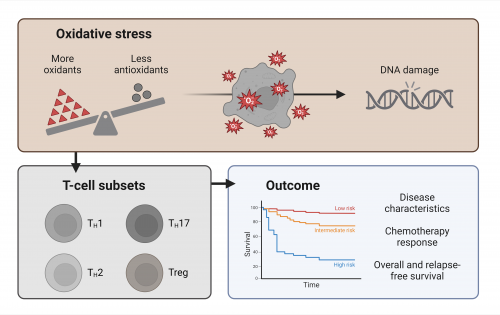CS6: Impact of oxidative stress in T-cell subsets on chemotherapy response and survival in patients with acute myeloid leukemia
|
|
The importance of T-cell immunity and its impact on the success of chemotherapy and survival in the context of hematologic diseases has recently been demonstrated in various studies for acute lymphoblastic leukemia and after allogeneic stem cell transplantation (allo-HSCT) for acute myeloid leukemia (AML). T-cells are regarded as a physiological barrier against malignant transformation, a chronic phase of immune attenuation often precedes the acute process. In this project, the influence of different T-cell subsets and in particular the effect of oxidative stress on T-cell immunity in relation to chemotherapy response and survival in patients with AML shall be investigated. For this purpose, patient samples from our biobank are used to unmask differences in T-cell immunity at initial diagnosis using a comprehensive FACS panel and to evaluate their influence on clinical (e.g. blast cells, inflammation, cytogenetics) and survival parameters (overall survival, relapse-free survival). 8-OHdG will be used to examine the influence of oxidative stress on T-cell immunity. The aim is to identify subgroups of AML patients who are associated with a particularly good or particularly poor overall survival, relapse-free survival or therapy response. A better understanding of this relationship could lead to promising patient-specific treatment approaches, as it is conceivable that host-T-cell immunity has a similar impact as the already examined graft-T-cell immunity after allo-HSCT.
Graphical abstract on the impact of oxidative stress in T-cell subsets on disease characteristics, therapy response and survival parameters in patients with acute myeloid leukemia (Created with Biorender.com). |
Photos: by UMMD, Melitta Schubert/Sarah Kossmann








